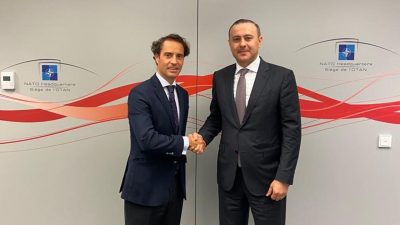Pivoting Armenia’s Sovereignty When “Shifting Alliances” Toward the West, When Azerbaijan “Threatens War”

All Global Research articles can be read in 51 languages by activating the Translate Website button below the author’s name.
To receive Global Research’s Daily Newsletter (selected articles), click here.
Click the share button above to email/forward this article to your friends and colleagues. Follow us on Instagram and Twitter and subscribe to our Telegram Channel. Feel free to repost and share widely Global Research articles.
***
Secretary of the Armenian Security Council Armen Grigoryan is pivoting the Caucasian country toward the West when his immediate priority should be securing Armenia since a conflict with Azerbaijan is seemingly close to breaking out. It is no secret that his appointment to the head of the Security Council initially caused legitimate concern among Armenians since it strayed from the traditional and longstanding relations Armenia has with Russia. However, his mission to derail Armenian-Russian ties is unsurprising when remembering that he was the former coordinator of election programs of Transparency International, a Soros-funded NGO with an obvious liberal agenda.
Grigoryan recently made another, but quite conceptual, trip to Brussels and had a working lunch with the special representative of the NATO Secretary General in the Caucasus and Central Asia, Javier Colomina. According to Armenian media, Grigoryan explained to Colomina “the security situation around Armenia and Nagorno-Karabakh, and also discussed the consequences of Azerbaijan’s illegal blocking of the Lachin corridor.”
Under the guise of “ecological protest,” Baku first blocked, then set up its own checkpoint on the road between Goris and Stepanakert, the capital of the Armenian-populated separatist region of internationally recognised Azerbaijan. This blockade has led 120,000 Armenians in the region to face starvation and shortages.
The US, Britain, and other Western countries, particularly France, are looking for ways to level out any agreements reached with the participation of Russia. Hence, numerous rounds of consultations with US Secretary of State Antony Blinken, European Council president Charles Michel, and others. This does not exclude the recently somewhat obscured negotiation format between Grigoryan, the Assistant to the President of Azerbaijan Hikmet Hajiyev, and White House National Security Advisor Jake Sullivan.
There is no doubt that Grigoryan is an active participant in the lobby aimed at both torpedoing the Joint Statement of November 10, 2020 and at Armenia’s exit from the CSTO, as he admitted himself in an interview with Novaya Gazeta in May. At this juncture, Azerbaijan is preparing for war by mobilising troops and equipment to the borders of Nagorno-Karabakh, yet this is the time when the Nikol Pashinyan government ruling in Yerevan is searching to overhaul Armenia’s security architecture completely.
This is a high-risk move, considering the outcome of the next military conflict is very clear: a major military defeat for Armenia, which will then be forced to even greater humiliation and territorial losses with the prospect of a de facto final loss of sovereignty. This option is more likely with Armenia’s complete severance of relations with Russia, which Pashinyan and Grigoryan are leading towards. The greater onus for this tragedy is on Gigoryan since he, unlike Pashinyan, is a Karabakhi Armenian.
Grigoryan announced advances in Armenia-US relations in the economic sphere about a month ago but complained that “cooperation between Yerevan and Washington in the military-political sense is not yet at the stage to be discussed.” However, on September 11, about 175 Armenian troops and 85 from the US will start exercises focusing on peacekeeping operations.
At a press conference following the G20 summit, Russian Foreign Minister Sergei Lavrov commented on the upcoming military exercises: “Of course, we don’t see anything good in the fact that an aggressive NATO country is trying to penetrate Transcaucasia. I don’t think this is good for anyone, including Armenia itself.”
According to the head of the Russian Foreign Ministry,
“wherever the Americans appear (they have hundreds of bases around the world), nowhere does this lead to anything good. At best, they sit there calmly, but very often they try to tailor everything to themselves, including political processes.”
Pro-Pashinyan media channels are oversaturated with calls from biased experts to minimise any ties with Russia. Often, they promote the fable of removing Russian military bases in Armenia and replacing them with American ones while advocating for the development of military ties with Iran despite the Islamic Republic being a sworn enemy of the US.
At the same time, by refusing to deploy a CSTO monitoring mission on the border with Azerbaijan in favour of European observers, Pashinyan and Grigoryan are minimising any meaningful contact with Moscow. The current ruling elite of Armenia views the US and their allies as reliable benefactors, believing that their dedicated service will ensure their personal and economic prosperity while securing the country from the Azerbaijani threat.
In this context, Grigoryan is almost the embodiment of pro-Western collaborationism and national betrayal.
The tendency for Armenians to believe ridiculous rumours and conspiracy theories provides fertile ground for various manipulations. But no matter what instructions Grigoryan received from his Western supervisors, further strengthening his position in Armenia does not bring anything good to the people of the republic and creates greater risks for them.
*
Note to readers: Please click the share button above. Follow us on Instagram and Twitter and subscribe to our Telegram Channel. Feel free to repost and share widely Global Research articles.
Ahmed Adel is a Cairo-based geopolitics and political economy researcher.
Featured image is from InfoBrics

